‘We are expected to be OK with not having children’: how gay parenthood through surrogacy became a battleground
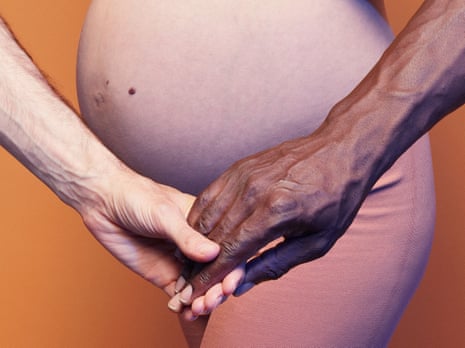
In New York, a gay couple fighting to make their insurers pay for fertility treatment have found themselves in the middle of a culture war. What happens when the right to parenthood involves someone else’s body?
Corey Briskin and Nicholas Maggipinto met in law school in 2011, were engaged by 2014, and had their 2016 wedding announced in the New York Times. They moved to a waterfront apartment block in Williamsburg, Brooklyn, with a bright playroom for families on the ground floor.
“We got married and then we wanted all the trappings: house, children, 401K [retirement saving plan], etc,” Maggipinto, 37, tells me in their building’s shared meeting room, tapping the table in sequence with the progression of each idea.
Briskin, 30, grew up assuming he’d have children. He came out in college. “Once I had come out to myself and others, I don’t think my expectation of what my life would look like changed all that much.” With marriage equality won years ago, they expected to be able to have a conventional married life.
Six months before their wedding, a targeted ad from an organisation called Gay Parents to Be landed in Maggipinto’s Instagram feed, offering free consultations with a fertility doctor who’d give them “the whole rundown” on how they could start a family. “We had the appointment and we were 100% on the same page – let’s move forward with this,” says Maggipinto.
That’s when they first became aware of the eye-watering cost of biological parenthood for gay men. Maggipinto reels off the price list in a way that only someone who has pored over every item could. There’s compensation for the egg donor: no less than $8,000 (£6,600). The egg-donor agency fee: $8,000-10,000. The fertility clinic’s bill (including genetic testing, blood tests, STD screening and a psychiatric evaluation for all parties, sperm testing, egg extraction, insemination, the growing, selecting, freezing and implantation of the resulting embryos): up to $70,000. And that’s if it all goes well: if no embryos are created during a cycle, or if the embryos that are don’t lead to a successful pregnancy, they would have to start again.
Then there’s the cost of a surrogate (called a “gestational carrier” when they carry embryos created from another woman’s eggs). Maggipinto and Briskin were told agency fees alone could stretch to $25,000, and the surrogates themselves should be paid a minimum of $60,000 (it is illegal for surrogates to be paid in the UK, but their expenses are covered by the intended parents). “That payment doesn’t include reimbursement for things like maternity clothing; lost wages if she misses work for doctors’ appointments or is put on bed rest; transportation; childcare for her own children; [or] lodging.”
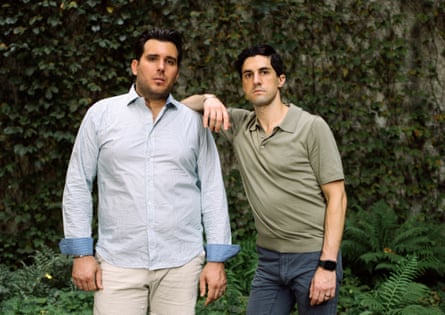
It takes 15 minutes for Maggipinto to run me through all the expenses they could incur if they tried to have a child genetically related to one of them. The bottom line? “Two hundred thousand dollars, minimum,” he says, tapping his index finger on the table with each word in disbelief.
They couldn’t afford it. Maggipinto earns a corporate lawyer’s salary but is saddled with student debt. Briskin used to work for the City of New York as an assistant district attorney, earning about $60,000 a year. His employment benefits had included generous health insurance. But when they read the policy, they discovered they were the only class of people to be excluded from IVF coverage. Infertility was defined as an inability to have a child through heterosexual sex or intrauterine insemination. That meant straight people and lesbians working for the City of New York would have the costs of IVF covered, but gay male couples could never be eligible.
This isn’t an oversight, it’s discrimination, Briskin says. “The policy is the product of a time when there was a misconception, a stereotype, a prejudice against couples that were made up of two men – that they were not capable of raising children because there was no female figure in that relationship.”
Briskin was working alongside colleagues who were happily availing themselves of the benefits he wasn’t entitled to. One of his co-workers – an older, single woman – became a mother using donor sperm, IVF and surrogacy. “It was hard,” he tells me quietly. “You want to be happy for people.” Their frustration at not being able to have their own children turned to anguish. “My sister – who is more than six years younger than me – just gave birth to her second baby,” Maggipinto says, twisting his wedding ring. “I was OK with not being a parent at 30, I felt that was very normal for our generation and the current work-life balance ethos. But seven years later, I’m really not happy.”
In April, Briskin and Maggipinto filed a class action complaint with the US Equal Employment Opportunity Commission (EEOC) against the City of New York, suing Briskin’s former employers for unlawful workplace discrimination. If they win, employers and health insurers across the US will be under pressure to change their policies to give gay men the same access to fertility benefits as anyone else. But their case has become much bigger than one couple’s drive to start a family: they have become figureheads in the battle for fertility rights for all gay men.
Maggipinto and Briskin braced themselves for some kind of backlash when news of their claim broke. But there was a deluge: on Instagram and Facebook, in audio messages and in their work email inboxes, on Reddit and beneath news articles. Wherever you could post public comments, there was condemnation.
A much-liked response to one piece about their story read: “Not having a uterus because you are male, does not make you ‘infertile’ – it makes you MALE. No one – and I do mean no one – has the right to rent another human’s body and womb to use as an incubator. That is not a human right.”
The international response was even more scathing.
“There was one article in a German outlet that was about how surrogacy is a form of slavery. We were being portrayed as people who were enslaving gestational carriers,” Briskin tells me, wide-eyed.
Most critics were wilfully missing the point of their case: it’s about access to IVF, and equal rights to employment benefits, not their right to surrogacy. But in bringing a fertility equality claim that took eventual surrogacy for granted, they had unwittingly stumbled into the line of fire of one of the great culture wars of our age: whether anyone – but gay men in particular – should be able to pay to use a woman’s body.
Advances in reproductive technology mean that pretty much anyone can become a parent so long as they can get hold of the requisite gametes and access to fertility treatment, but people with male bodies face specific challenges: someone has to do the gestating. In the years since same-sex marriage has been legalised across the western world, demand for surrogacy has soared. In England and Wales, the number of parents using a surrogate has quadrupled over the past 10 years, but it is always controversial: high-profile gay men from Brian Dowling to Tom Daley have been accused of exploitation, “womb rental” and even “child abuse” when they go public about creating their families with a surrogate.
Surrogacy always comes with serious legal and ethical challenges, whether it is traditional (using the surrogate’s eggs) or gestational; altruistic or commercial; gay or straight. Surrogates have been asked to abort babies against their will when intended parents split up, when too many embryos implant successfully, or when the baby they are carrying is found to have birth defects. Commercial surrogacy is banned in almost all of Europe, leading some to seek it abroad. After India and Thailand closed their doors to fertility tourists in 2015, Ukraine became the go-to destination; when war broke out in February, thousands of women pregnant with other people’s children were in turmoil while the panicked intended parents tried to work out how to get them and their precious cargo out of the country. In 2020, hundreds of surrogate babies were left stranded in Kyiv because of Covid travel restrictions. Surrogacy is legal to some degree in almost every US state. American women have died in recent years during surrogate pregnancies and deliveries, while egg donors have been left infertile and seriously ill after their eggs were harvested.
So why not adopt?
Briskin and Maggipinto pause before answering this. “I have never been opposed to adopting, [or] even to having a foster child to see where that leads,” Maggipinto says, eventually. “But as a couple we’ve come to a decision that having a child that’s biologically connected to us is important.”
“I’m not wringing my hands here,” Briskin says. “It really feels like such an affront to be asked this question. I find it deeply offensive. Nobody asks the person who’s having children naturally why they did it instead of adopting. I help others in other ways – but that’s just not how I’d choose to do it.”
“Private adoption is overwhelmed with religious-affiliated organisations,” adds Maggipinto.
“Who would exclude us.”
“By definition.”
They never claimed any right to surrogacy, Maggipinto says. “I think a woman willing to do this is enormously generous. In the same way that I feel like I’ve been robbed of time in my life because I don’t have a child yet, I feel like the sacrifice a woman makes to be pregnant for someone else is an enormous chunk of time out of her life that she’ll never get back, and the compensation really is a token for that.”
“I am pro-autonomy,” Briskin says. “I believe that people should be able to make decisions about their lives, their bodies. This is so relevant now, with the decision from the supreme court [overturning Roe v Wade]. For me, it goes into the same category as sex work: there’s this puritanical belief that sex workers are being forced to sell themselves. There are many, many sex workers who do not view their line of work that way.”
Of course, there are many women who are forced to sell themselves, I say – those who are trafficked and exploited. Briskin knows this well: he was a sex crimes prosecutor. “Those who are being trafficked are not being compensated for their sex work; any compensation is going into the hands of their pimp,” he replies. “That is not the case for a willing surrogate.”
There’s a stark contrast between American and Ukrainian surrogates, Maggipinto says. “Here you have to be a woman who has already had children, who is over a certain age, who can prove that she is independently financially capable of sustaining herself without her surrogate compensation. You effectively cannot be a poor surrogate.” He is referring to the American Society for Reproductive Medicine’s guidelines, but with no official regulation in the US, there’s no compulsion for anyone to follow them.
When it comes to the fear that gay surrogacy erases mothers, Maggipinto is defiant. “Our family will be a motherless family,” he says, tapping his finger on the table again, “I won’t tiptoe around that.” But the creation of that family doesn’t depend on the exploitation of women. “We’re not using a woman’s body. We are accepting a woman’s generosity to use her own body in a way that she agrees with.”
‘Let me go on record – I am not homophobic,” Phyllis Chesler tells me. “I live with a woman. I am very progressive, but not in the way defined by those who think it’s just peachy keen to have a commercial industry based on the exploitation of impoverished women.”
Chesler is an author and a professor of psychology and women’s studies. She has been a critic of surrogacy ever since she campaigned for the rights of Mary Beth Whitehead, the New Jersey surrogate who fought for custody of the baby she carried in 1986. (Whitehead’s case was ultimately unsuccessful.) When New York state voted to legalise commercial surrogacy in 2020, Chesler was one of the most vocal campaigners against it. The fight was still fresh in her mind when she heard about Briskin and Maggipinto’s claim.
“Gay men now want insurance companies to treat being born male as a disability or as a protected category, one which requires paid compensation,” she wrote in an article for a feminist website published a few days after the men filed their complaint. “They are protesting the ‘unfairness’ of not having been born biologically female.”
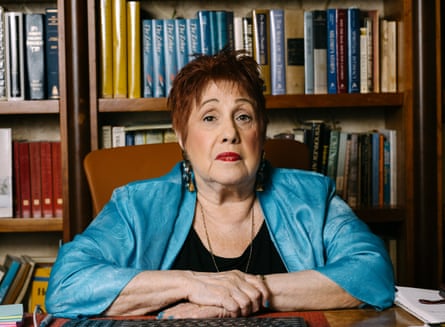
We sit at the dining room table of her Upper East Side apartment, surrounded by books and papers. Chesler has printed off Briskin and Maggipinto’s wedding announcement, and she triumphantly taps her blue fingernail on the text that says Briskin’s mother is a senior vice-president at Merrill Lynch.
“One of them comes from a wealthy family. The wealthy know the world’s their oyster: they can buy whatever they want and if the poor are ill-served, well, so be it, it’s the way of the world. This way of thinking is involved in surrogacy. Nobody is saying: ‘I would rather give up this longing if it means harming another human being.’ The types of people who opt for surrogacy are entitled, used to getting what they want. Here I include celebrity women who do not want to ruin their figures.” She rejects the idea that adoption agencies would refuse to take on Briskin and Maggipinto. Gay men want surrogacy instead of adoption, she says, because of “genetic narcissism”.
Also among Chesler’s papers is a copy of Maggipinto and Briskin’s legal complaint. She has read it closely. “This particular case, yes, I have to concede, it is discrimination. It is! But let’s balance it all out. The desperate egg donors and the surrogates who have to do this – they were discriminated against. Women don’t get the same educations … Women are discriminated against everywhere, but especially those who become gestational carriers.”
READ RELATED: Can food REALLY be as addictive as alcohol and cigarettes?
Fracturing the role of mother into egg provider and gestator obfuscates and minimises female input in reproduction, making it easier for the intended parents to control the process, Chesler says. “The disappearance of womankind has been ongoing – this is another kind of disappearance. It is a land grab.” This will sound familiar to anyone who has followed arguments made by gender-critical feminists over recent years: that women are being erased, and their biology is being appropriated.
Where Briskin invokes the right to choose an abortion alongside the right to choose whether to carry a child for another person, Chesler sees reproductive compulsion. “We’ve lost the right to control our bodies, to refuse to be mothers, and at the same time – given economic realities of impoverishment – we are then forced to bear children for the wealthy.” She shakes her head.
“The women who say: ‘Oh, we’re happy surrogates’? Like the so-called sex worker, she has to dissociate from what’s happening to her body. This is not mentally healthy. If it was such a wonderful thing to do, then why don’t the wealthy do it for the poor, who are as infertile? As for the woman who thinks this is the most productive or significant or powerful thing she can do – this tells me everything I need to know about her alternatives, which are zilch.”
Chesler is a mother and a grandmother. She has been married several times – most recently to a woman. Their wedding certificate is framed on the wall. “If you balance the women who could die in pregnancy, the women who could become infertile because of their eggs being harvested, who must endure pain and loss of time in a way not commensurate to what they are being paid, against this new desire of a gay male couple to use surrogacy as their first option, I think the balance of suffering is more on the female side.”
More than 200 miles away from New York, on a leafy cul-de-sac in Columbia, Maryland, Lisa Schuster is curled up in an armchair with her elderly terrier who is deaf and blind and bewildered by the smell of my presence. The hum of family life surrounds her. Her 15-year-old son is on the computer upstairs, her 13-year-old is on his way home from camp, and her daughter, 11, is clattering around in the kitchen.
Schuster, 38, has given birth five times: three times for herself and her husband, and then twice for a gay couple from France. She had her first child when she was 23, just after she got married. “And it was so easy. We just said we wanted to have kids – nine months later we had a baby,” she tells me. “My mother passed away very young. I stepped back and thought, who knows how long anybody has in the world? I wanted to prioritise what I wanted to accomplish. I picked family.” Schuster has a college degree and has always worked, but is the primary caregiver, choosing jobs that fit around her family life.
Growing up, surrogacy was part of family folklore. “My mom would always tell us a story about a very close friend who, in a very unofficial way, was a surrogate for somebody else in their family. It had a happy ending – it worked out well.” When Schuster came to have her own kids, she realised how lucky she was: while her sisters-in-law went through fertility struggles, she conceived easily, and all her pregnancies and births were straightforward. Surrogacy was a way to “recognise the blessing that I had in my own children and being able to pay that forward”.
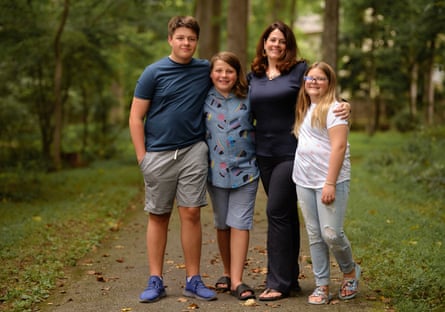
She knew her family was complete when her daughter was born. “I was like: ‘I know I’m done; I’m ready to do this again’.” She Googled “surrogacy agency Maryland” and filled out a questionnaire with basic medical information. A case manager contacted her for more details: she had to provide character references and her previous pregnancy and delivery records for them to review. Then someone came out to inspect her home. “They checked everything looked good, that it didn’t smell of smoke and was safe, that whatever future parent I might be carrying for would feel comfortable with the environment I was gestating in.”
So far, all of this sounds like it’s for the benefit of the intended parents, not her. She says she also met with a mental health provider, both with her husband and in a group session with the intended parents, before they went ahead. “There were so many things I hadn’t thought about. She asked how I would feel if I had to terminate the pregnancy or if the baby had any health issues when they were delivered. She asked what my family thought about it and how it would impact friendships. She also asked about my plans for the compensation to get to what was motivating me.”
Schuster received $25,000 for the first surrogate pregnancy, and $30,000 for the second, paid in instalments at embryo transfer, positive blood test, confirmation of heartbeat and delivery. She carried on working at her day job during both pregnancies, and used the surrogacy fee to pay off student loans and to fund a trip to France for her entire family – during which she paid a visit to the family she had carried for. (The girl and boy are now eight and six.)
She breaks into a broad smile as she describes meeting “the guys” for the first time. “They’re just really lovely people that you would meet and be friends with outside of this strange circumstance that brought us together. I was a little bit afraid that I would feel some sort of class division or inequity there, and it was absolutely not the case. They were just regular people.” They don’t have an ongoing relationship with the egg donor, which Schuster says is “the norm”. She knows nothing about her.
Her surrogate pregnancies were “easy, uneventful”. Schuster didn’t worry about the toll they might take on her body. “What’s a few more stretchmarks? It never even crossed my mind.” She enjoyed feeling the baby kick and move around, and would film it and send the videos over to “the guys”, but she assures me she never felt a connection with the babies that grew inside her. “You go into a different mental capacity from the start. For me, the relationship that was growing was actually with the dads as opposed to the baby. That’s where the bonding energy transferred to.”
They were by Schuster’s side when she delivered their daughter. “As soon as she was born, they put her on my belly while they cut the cord and cleaned her up.” Then one of the dads held her. “His father had passed away before they started their journey, and she has a little dimple in her chin like his father did.” Schuster is suddenly overcome with tears. “That was part of our connection too, because I had lost my mother before I became a parent. Seeing it there, seeing his father’s chin in his daughter, seeing them together was just the culminating moment of everything. It was just such a happy moment.” Where Chesler sees genetic narcissism, Schuster sees family continuity.
“I was a little taken back – not taken aback, but surprised – when the guys left. We had got so used to seeing each other every day – they were here for about four weeks around delivery – so making that transition … ” she shrugs. “I didn’t expect to feel that sadness.” But it was easier the second time around, when she gave birth to their son. “I knew what to expect, and how we had fallen into the rhythm of our relationship. I could prepare for the sadness of their leaving, but I knew it wasn’t the end.”
Schuster says we “shouldn’t sugarcoat” the potential problems. “Surrogacy does have the capacity to exploit women, and certainly is currently practised in ways that do. We need to ask, what things are in place that make it exploitative for women? Is that true for all cases? You need to make that distinction.”
Doesn’t payment create an inducement that exploits women? “That’s certainly a very relevant thing to think about, especially if you’re looking at countries where the compensation has a life-changing effect on a woman. In the US, as compensation rates continue to increase, at what point does it become incentivising? The financial compensation should never be the primary benefit. That’s the line where it can become exploitative.”
The critics who argue that surrogacy fragments the reproductive role of women and reduces them to body parts are the same people who refer to what Schuster has done as “womb rental”, she says. “All of those other things that I was doing have no value in today’s society: the time that I missed caring for my children or taking care of my household, that mental load I carried. If you don’t value all the work that’s going into it, you’re going to assign that value to the womb.” She has been paid for the time and effort it took to be pregnant for someone else, she says, not for the use of her womb.
Schuster tried to carry again for a local gay couple, but the embryo transfer failed. Almost as soon as she gave up being a surrogate, she saw a job advertised at the advocacy organisation Men Having Babies, where she now works as director of programming. Campaigning for ethical surrogacy matters to her on a personal level, she says. “I don’t want the surrogate daughter I carried to ever question if she’s here because someone was taken advantage of. I always want her to feel that I benefited from that process too – it added to my life in so many positive ways. It was a really joyous experience for me.”
Heather Breault, 30, is also married with three children, and has carried two surrogate pregnancies, most recently giving birth in November 2021. Breault thinks of surrogacy as a kind of voluntary service. “I had my kids young, so I couldn’t volunteer or donate money: I didn’t have the money; I didn’t have the time. What I did have was my body,” she tells me over Zoom from her home in East Haddam, Connecticut. She signed up to donate bone marrow, then offered to carry a baby for a friend who was struggling with fertility issues; when her friend declined, she went online and found a surrogacy agency who matched her with a gay man from the Cayman Islands.
It didn’t matter to her that he was single. “I was very open-minded.” She and her husband spoke to him over FaceTime. “You could tell that he really wanted to be a parent, and this was the only chance for him to do that,” she tells me, with tears in her eyes. Like Schuster, Breault has no idea who the egg donor was, or the criteria used to choose her, but tells me there are good reasons for separating donor and carrier: egg donors need to be young, whereas surrogates should ideally have already given birth to several children of their own before they carry for someone else. The separation helped her detach herself from the babies she carried. “It was none of my DNA – I’m more like a babysitter.” She was paid $40,000 for the first pregnancy, and $45,000 for the second. The money went on a downpayment on their house, on furniture and into savings. “But I would have done it without the money. You have to go into it wanting to do it for other reasons.”

Unlike Schuster, Breault had complicated deliveries. She had pre-eclampsia for the first birth, which meant the baby had to be delivered a week early, while she was heavily medicated. “I didn’t do the research I feel like I should have done. But I still wouldn’t take it back for anything – the delivery was the best feeling ever.” Almost immediately, the intended parent wanted her to carry for him again. “He requested it. He was like ‘Can we hurry up and get started?’” she laughs. “He would have done it right away if he could.” Breault was anaemic after the first birth, and the agency said they needed to wait at least nine months between pregnancies anyway. As soon as she had the green light, she was happy to try again.
“We ended up having a C-section for the very last one,” Breault tells me. “I didn’t really know much about C-sections. I knew that they cut you open, they take the baby out and they stitch you back up, but the healing process wasn’t really explained to me. I wasn’t prepared for how much I would not be able to move after.” Her husband took a week off to help her with their three young children while she recovered but, after that, she was on her own. I feel uneasy hearing this: Breault comes across as so earnest, so determined to help others, and it feels manifestly wrong that she wasn’t adequately forewarned of what might happen to her. But she shrugs it off. “It was OK, but it made me feel like my body couldn’t handle it any more.” She’s no longer on the agency’s books.
Less than a year after she gave birth, Breault gets news through her Facebook feed of the children she carried. “It’s not like he and I talk any more, but we still can see into each other’s lives. I’m fine with that.” She smiles. “It’s nice to see them growing up. They look just like their dad.”
‘More and more people in the male gay community are thinking of parenting at a younger and younger age,” says Ron Poole-Dayan, executive director of Men Having Babies. “After the demographic disruption of the Aids pandemic, gay people have become more able and likely to form stable relationships, that increasingly got more social recognition. They started being exposed to more examples that negated the narrative that you shouldn’t be sad about not having a family. It was almost cruel to have a lot of these people realise ‘I can do that; I just can’t afford it’.’”
Poole-Dayan is the father of 21-year-old twins conceived using eggs donated by his husband’s sister and gestated by a surrogate. “Surrogacy is a gay issue,” he tells me. “It’s not just that we are more visible when we do it, it’s that we’re more dependent on it. The surest way to ensure that gay men don’t have children is to be against surrogacy.”
What about adoption? “We consider adoption [to be] a form of volunteering. It is not a way to become parents,” he says. “As a society, we should use whatever power we have to ensure there are no children that require adoption. Telling us that we should depend on the failing of society, and that’s a solution for us – it’s unacceptable. Why should we step up to volunteer before any other group?” Because your path to biological parenthood involves asking for great sacrifices and a physical toll from women, I say. “If you can’t have ethical surrogacy, don’t do it. Nobody says you have to become parents. It comes down to the simple notion of, are we all willing, autonomous, of the right mind, and protected.”
Where Chesler and Briskin draw parallels with sex work, Poole-Dayan talks about men in uniform. “Do we know that the people who are dying for us in most professional armies are not doing it because they didn’t have any other career choice? Firefighters are doing something that degrades their body and could lead to irreversible harm. We pay them less than they deserve because we assume they are patriotic or somehow motivated altruistically.” They have no one fighting for their rights like the people who criticise surrogacy so vociferously. “It could be legitimately asked, what are their motivations?”
Poole-Dayan sees the “situational infertility” gay men face as equivalent to medical infertility. “We define infertility as not just a condition or a disease but also a status that defines our inability to procreate with our partner.” It doesn’t matter if you have healthy sperm, eggs and wombs; if you can’t make a baby with your chosen partner, you are infertile, by this definition. “Situationally, we are the most infertile, by measure of the level of intervention that is required to achieve a pregnancy. We’re also expected to be OK with not having children. This is the kind of discrimination we’re trying to fight the most.”
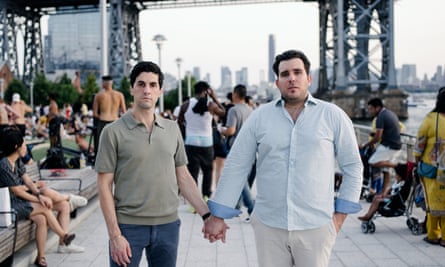
Today, biological fatherhood only exists for rich gay couples – or poor ones. Men Having Babies’ Gay Parenting Assistance Programme gives out more than $1m a year in discounted and free medical services and cash grants to those in serious financial need. But Briskin and Maggipinto don’t qualify.
“I want to be really clear – if we could have afforded to have a child out of pocket, all of these costs, we would,” Briskin says.
“We have looked into different subsidy programmes, loans – we’ve entertained the idea of doing a crowdfunding type of thing. We’ve talked about asking family for financial support,” says Maggipinto. “We’re not willing to foreclose any of those options, because we are at a point of desperation.”
The EEOC will rule on whether the terms of Briskin’s health insurance were discriminatory within a few weeks. The City of New York has so far defended its policy. The couple’s attorney, Peter Romer-Friedman, tells me: “They say their healthcare plan doesn’t provide surrogacy for anyone, so it’s not discrimination to deny it to Corey and Nicholas.” Just like everyone else, the city’s first response was to assume this was all about access to surrogacy.
While they wait for a decision, Maggipinto and Briskin must endure the heartache of watching the children of their wealthy gay friends grow up. We meet the day after Father’s Day. “We just took care of my nephew when my sister needed help,” Maggipinto tells me. “It’s so awkward for me to wish my brother-in-law Happy Father’s Day.”
“Not everybody wants to have children, and I get that; it’s not a necessary part of one’s existence on this Earth,” Briskin says. “But if you are among those who do have the desire to procreate, no one wants to be told there is no way to achieve that.”
Maggipinto nods. “Especially if there is.”
Source: Health & wellbeing | The Guardian






